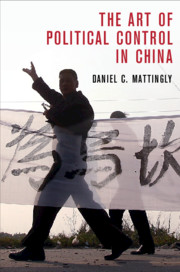Book contents
- Frontmatter
- Dedication
- Contents
- List of Figures
- List of Tables
- Acknowledgments
- 1 Introduction
- 2 A Theory of Political Control
- 3 The Communist Party’s Governance Challenge
- 4 Cultivating Civil Society
- 5 Co-optation
- 6 Infiltration
- 7 Conclusion
- A Additional Figures and Tables
- B Survey Design
- C Qualitative Research Design
- Bibliography
- Index
- Other Books in the Series
4 - Cultivating Civil Society
Published online by Cambridge University Press: 18 November 2019
- Frontmatter
- Dedication
- Contents
- List of Figures
- List of Tables
- Acknowledgments
- 1 Introduction
- 2 A Theory of Political Control
- 3 The Communist Party’s Governance Challenge
- 4 Cultivating Civil Society
- 5 Co-optation
- 6 Infiltration
- 7 Conclusion
- A Additional Figures and Tables
- B Survey Design
- C Qualitative Research Design
- Bibliography
- Index
- Other Books in the Series
Summary
Cultivating civil society – encouraging the establishment of non-state groups like churches, temples, or civic associations – can strengthen the state’s informal control over society. In this chapter, I show how local officials in China encourage the establishment of lineage associations, temple organizations, and social clubs as a way to infiltrate local society and increase their informal authority. I draw on case studies and a national dataset to show how the presence of these groups helps local officials requisition land and suppress protest. Governments outside China, from Asia to Latin America, have engaged in similar forms of informal control, suggesting the theory may not be limited to China. The flip-side of informal control is that if communities lack strong social organizations, activists can find creative ways to mount spontaneous, leaderless resistance.
Keywords
- Type
- Chapter
- Information
- The Art of Political Control in China , pp. 87 - 119Publisher: Cambridge University PressPrint publication year: 2019

